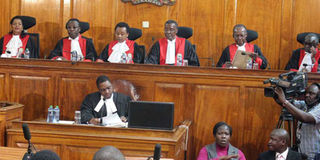Supreme court’s work may not be over yet

Supreme Court judges from left to right: Njoki Ndung'u, Smokin Wanjala, Philomena Mwilu, David Maraga, Jackton Ojwang', and Isaac Lenaola announce the verdict of the election petition case, at the Supreme Court on September 1, 2017. The court nullified President Uhuru Kenyatta’s poll victory. PHOTO | DENNIS ONSONGO | NATION MEDIA GROUP
What you need to know:
- The Judiciary was prepared to pay the ultimate price and he called for Kenyans of goodwill to stand with them.
- For the past three weeks, the Supreme Court has been abandoned and left to carry its cross of threats, insults and persecution.
- The Supreme Court may feel it is entitled to a well-earned rest but they should not travel far.
Twenty four hours before delivering the final judgment on the presidential petition, Chief Justice David Maraga gave his most passionate and courageous defence of the rule of law and the independence of the Judiciary.
He stated that attacks on the Judiciary had become more frequent, aggressive and bordering on violence since September 1.
Mr Justice Maraga said that despite the persistent abuse and intimidation, he would not act on the whims and desires of the Executive and Parliament.
Instead, the Judiciary was prepared to pay the ultimate price and he called for Kenyans of goodwill to stand with them.
Mr Maraga was bold and outspoken but his body language suggested that the persistent attacks and raw aggression were taking their toll.
BATTERED MAN
He looked a lonely, battered man who had been abandoned by the forces of good. A few weeks earlier, religious and civic bodies challenged Nasa to take their case to the Supreme Court. Yet when the highest court in the land nullified the presidential election on September 1, there was only token support for the court’s decision. For the past three weeks, the Supreme Court has been abandoned and left to carry its cross of threats, insults and persecution.
Isolated and besieged, the Judiciary has been crucified while institutions with influence washed their hands of the verdict. Few had the courage to take the risk of offending their tribe and tithe payers.
In the vacuum, the Nasa and Jubilee troops took over the airwaves and the ruling was debated as if it were just about Raila Odinga and Uhuru Kenyatta and not about Kenya, its people, the Constitution, values and the future.
The larger picture and the country’s unity were ignored and forgotten. As a result, the country has become extremely polarised and opinions hardened since September 1.
There is a sordid, toxic, public atmosphere that makes a credible, peaceful election almost impossible — and probably unmanageable — on October 26.
RULE OF LAW
The Supreme Court may have been lauded the world over but vilified in its home turf because citizens have not internalised respect for the rule of law and politicians on every side expect the Judiciary to serve their immediate interests. The Moi legacy lingers on like a bad virus. Independence of the Judiciary requires respect for its decisions, especially when you do not approve.
Where do we go from here? The IEBC may have been spared criminal responsibility for a botched August 8 ballot but other forces will be required to midwife a fresh ballot in three weeks. It is hard to envisage the IEBC, Jubilee and Nasa sitting in the same room and coming to an agreement on how the presidential rerun will take place.
Politicians need to be warned that we are on the precipice again and neither candidate must be allowed to push this great nation over the edge.
Never were voices of reason, sanity and influence more needed to offer hope and to put a smile back on Kenyans faces.
The Supreme Court may feel it is entitled to a well-earned rest but they should not travel far. Their services and those of others may still be needed as we are certainly not out of the woods yet.
Fr Gabriel Dolan is a Catholic priest based in Mombasa. [email protected] @GabrielDolan1





